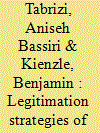|
|
|
Sort Order |
|
|
|
Items / Page
|
|
|
|
|
|
|
| Srl | Item |
| 1 |
ID:
134535


|
|
|
|
|
| Summary/Abstract |
At the time of writing, representatives from Iran and the E3/EU+3 are trying to work out an agreement that will guarantee that Iran’s controversial nuclear programme, widely suspected of having a military purpose, serves only peaceful ends. As the negotiations enter their most crucial phase, the time is ripe to attempt an assessment of the role played by the only actor, besides Iran, that has been on stage since it all began over ten years ago: Europe. Throughout this long drama, Europe’s performance has had some brilliant moments. Yet the quality of its acting has decreased as a new protagonist, the US, has come on stage. Overall, the Europeans’ record is positive, albeit not entirely spotless.
|
|
|
|
|
|
|
|
|
|
|
|
|
|
|
|
| 2 |
ID:
163044


|
|
|
|
|
| Summary/Abstract |
In this article, Aniseh Bassiri Tabrizi argues that, in the aftermath of Brexit, informal groups of states are likely to become a frequently adopted tool for EU member states when dealing with foreign policy issues. Because of their features, such frameworks enable the UK to continue to cooperate with the EU on an ad hoc basis on areas of mutual concern. Further, they grant a much-needed flexibility compared with treaty-based provisions.
|
|
|
|
|
|
|
|
|
|
|
|
|
|
|
|
| 3 |
ID:
174712


|
|
|
|
|
| Summary/Abstract |
The European Union has seen the rise of informal groups of states as an increasingly important governance mechanism within its formal structures. Such groups can make decision-making processes more efficient, but they also suffer from a substantial lack of legitimacy in the eyes of the non-members. In this article, we examine how informal groups overcome this fundamental dilemma between efficiency and legitimacy and sustain themselves at the forefront of important policy areas. To this end, we trace the development of what we argue to be a particularly useful case: the E3 directoire in the nuclear negotiations with Iran. The empirical results point to new insights into how directoires – and informal groups in general – can use different types of legitimation strategies to gain and maintain legitimacy. More specifically, the E3 implemented three successive legitimation strategies – detachment, co-optation and integration – using different types of legitimacy sources, in particular problem-solving, institutional adjustments and fostering institutional and policy congruence.
|
|
|
|
|
|
|
|
|
|
|
|
|
|
|
|
|
|
|
|
|